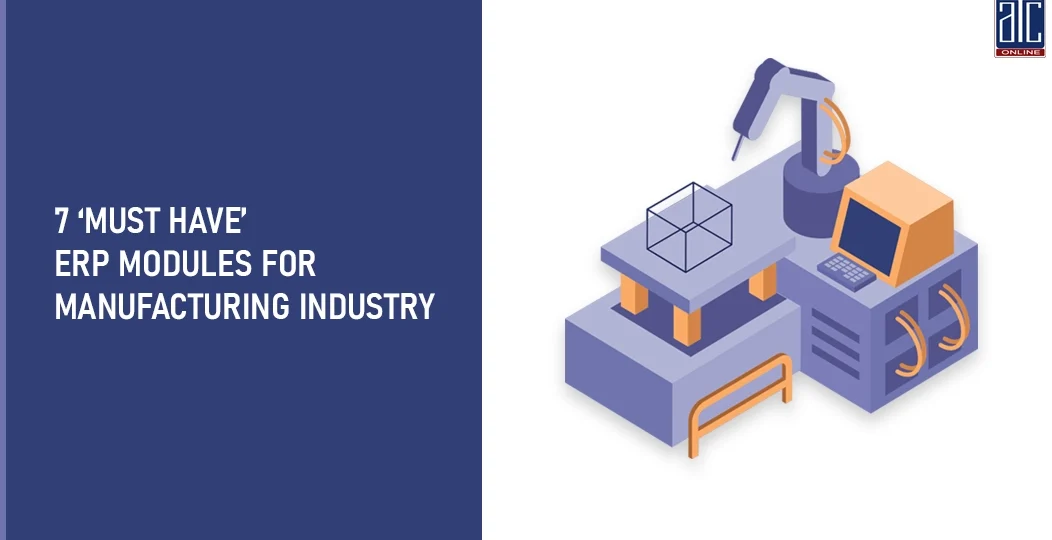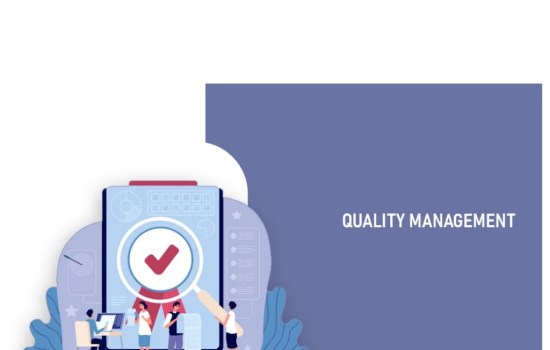
Enterprise Resource Planning (ERP) systems are software packages that are used to manage and streamline business processes in a variety of industries, including manufacturing. ERP offers a unified platform for consolidating data, streamlining operations, and linking all departments within an organization.
ERP in the manufacturing industry can assist in automating and improving processes such as production planning, scheduling, inventory management, and quality control. Such systems can help manufacturing industries keep costs down, increase efficiency, and boost consumer fulfillment by automating and streamlining key processes.
Industries have recognized the significance of integrating ERP solutions to streamline their business operations in the post-pandemic world. In response to the difficulty in sourcing manpower for the shop floor during lockdowns, manufacturers have shifted towards greater automation in their operations. The ERP modules required for a manufacturing company are determined by the type of operations that need to be automated. The following are the key ERP modules for manufacturers:
PRODUCTION MANAGEMENT

In the manufacturing business, production management entails the application of numerous techniques and tactics to efficiently manage the production operations. This comprises resource management, material management, machinery management, labor management, and other components of the manufacturing process. Production management also includes developing a production plan, monitoring and evaluating production, and implementing required modifications to guarantee that the production process runs smoothly and efficiently.
A production management module in an ERP module uses automated and data-driven production processes to optimize the production line. This solution is used to monitor production data such as production scheduling, production forecasts, strategy, production costs, and bill of materials. The production management is also in charge of overseeing and controlling production planning and other operations. The module can identify possible manufacturing difficulties and resolve them in a timely way by automatically tracking the status of production processes. Furthermore, by linking with stock levels and Materials Requirement Planning, the system can verify that the necessary number of materials are accessible for the production process.
MATERIALS REQUIREMENT PLANNING

Manufacturing is contingent on the accessibility of raw materials and in the amount required. As a result, it is critical to automate raw material planning, scheduling, and ordering depending on a variety of parameters. Material Requirements Planning, or MRP, is a software tool that compares current inventory levels to production capacity and assesses which goods to produce, what quantities are required, and when they are required, all based on the software’s projection.
An MRP system gathers production planning data from a variety of sources, including the product’s bill of materials, master production schedule, production stock levels, and other data sources, to compute what materials are required and when. MRP is essential for manufacturers as it supervises the manufacturing, purchasing, and delivery operations. MRP assists manufacturers in maintaining low production inventory levels. It also aids in more effective inventory management while decreasing client lead times. All of this results in a boost in the overall manufacturing process, leading to greater revenues and customer experience.
PRODUCT DATA MANAGEMENT

An ERP system’s Product Data Management (PDM) module is intended to assist firms in managing their product data, which includes product design, specifications, and associated paperwork. The module ensures that all product data is correct, up to date, and secure. It also assists firms in managing the lifespan of their products, from design and development through manufacture and distribution.
The PDM module includes features such as product lifecycle management (PLM), product configuration, product data synchronization, document management and collaboration, and product data security. It also includes features such as product catalogs and product data analysis. The module enables organizations to manage the product data across multiple departments and locations in a secure and efficient manner.
PDM gives enterprises the tools they need to manage product data from design through delivery. It also aids in the streamlining of product development and production operations by making product data available in a single repository. PDM insights assist manufacturers in implementing practical cost accounting, anticipating logistical challenges, and driving sales orders without negatively impacting the bottom line.
SUPPLY CHAIN MANAGEMENT

Supply Chain Management (SCM) is a module inside an ERP system that automates and streamlines the supply chain management process. It assists businesses in planning and managing their inventory, order fulfilment, and logistics. SCM facilitates the exchange of goods, materials, and information among suppliers, manufacturers, distributors, and consumers. It also aids in cost reduction, efficiency improvement, and increased customer satisfaction. Processes like sales order processing, inventory management, purchasing, shipping and receiving, and customer care may all be automated with the aid of this module.
SCM also aids in the tracking of supply chain performance, allowing firms to make better decisions. An SCM module in an ERP system may incorporate the following features:
- Automated Order Processing – Automates the entire process of order creation and management, from initial customer request to order fulfillment.
- Inventory Management – Tracks inventory levels, reorder points, and safety stock levels to ensure that materials and products are available when needed.
- Procurement – Tracks supplier contracts, purchase orders, and vendor performance to ensure timely delivery and quality of goods.
- Shipping and Receiving – Automates the process of shipping, receiving, and tracking goods.
QUALITY MANAGEMENT

Products must go through quality tests and evaluations once they are made. Even throughout the production process, comprehensive quality management capabilities aid in preventing faulty items from reaching the market. Quality management is an important component of an ERP system because it assists businesses in ensuring that the products and services they manufacture and deliver are of the highest quality. ERP quality management encompasses a variety of procedures and technologies that may be used to monitor, regulate, and enhance quality standards across the enterprise.
In ERP, quality management is often categorized as follows: quality control and quality assurance. The practice of ensuring that products and services achieve a predetermined level of quality is known as quality control. The practice of monitoring and confirming that quality is maintained throughout time is known as quality assurance. Quality management tools in ERP include product design reviews, process control, and product testing. These tools assist companies in ensuring that their goods and services match the needs of their customers as well as industry standards.
ENTERPRISE ASSET MANAGEMENT

Enterprise Asset Management (EAM) is an ERP system module that assists firms in managing their physical assets such as buildings, equipment, and infrastructure. EAM can be used to plan, manage, and maintain assets in order to improve their effectiveness, efficiency, and profitability while lowering their ownership and usage costs.
An EAM is often responsible for managing the whole asset lifespan, including purchase, tracking, maintenance, depreciation, and disposal. This platform may also be used to detect and track asset expenditures such as maintenance and replacement costs, as well as to produce reports that give insights into asset use and performance.
Manufacturers can utilize EAM to have a better understanding of their assets and the expenses involved in maintaining and using them. This may lead to increased asset usage, decreased asset maintenance costs, and improved asset investment decision-making. Also, companies may save time and money while enhancing the performance and dependability of their assets by automating their asset management operations.
BUSINESS INTELLIGENCE

The Business Intelligence (BI) component of ERP assists manufacturers in making data-driven choices to improve the performance of their business operations. BI provides extensive analysis and reporting tools to gain important insights from ERP system data. Typically, the module contains tools for data mining, data analysis, data visualization, and predictive analytics, among other things.
The BI module is frequently used to identify areas for development and chances for growth. It is capable of analyzing customer data, sales patterns, and profitability. It may also be used to discover areas where the company can save money and improve efficiency. In addition, the module may be used to develop prediction models and identify possible hazards and opportunities.
Organizations may use BI to obtain access to vast volumes of data from within the ERP system, allowing them to make choices based on real-time data. The module also gives access to historical data, allowing users to obtain insights into company trends and patterns. Additionally, it enables enterprises to develop customized performance reports and dashboards. Undeniably, the BI module gives enterprises the tools they need to make data-driven choices.
FINAL THOUGHTS.
An ERP system can help manufacturers optimize operations and provide visibility into their production, inventory, and various other aspects of operations. It has the potential to improve customer service, increase operational efficiency, and save expenses. The software also gives a unified picture of the whole business, making it easier to make decisions and prepare ahead of time.
PACIFYCA by ATC ONLINE is a comprehensive Enterprise Resource Planning (ERP) for the contemporary manufacturing sector. Our ERP solution is a future-ready, yet easy, one-point integrated platform that synchronizes all important organizational entities. For more information on PACIFYCA ERP, visit us at: www.atconline.biz
You could also contact us at https://atconline.biz/contact/ for business enquires and product information.
















